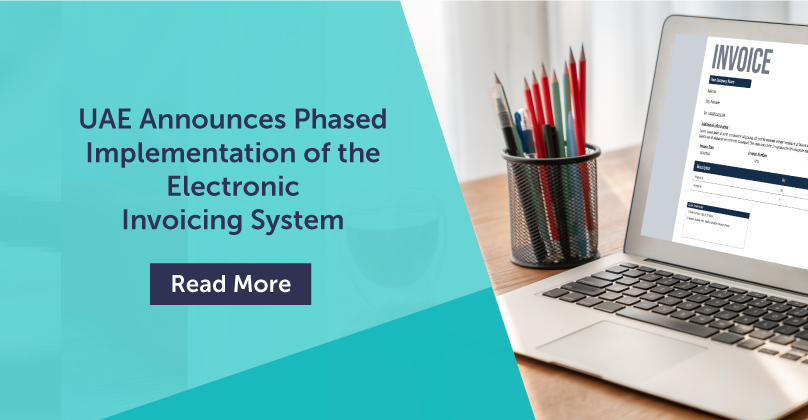
- Sep 30,2025
- Digital Transformation
UAE Announces Phased Implementation of the Electronic Invoicing System
The UAE Ministry of Finance has taken another major step towards building a fully digital tax ecosystem with the issuance of Ministerial Decision No. 244 of 2025. This decision sets out the phased implementation plan for the country’s new Electronic Invoicing System (EIS), following the framework established by Ministerial Decision No. 243 of 2025.
What is the Electronic Invoicing System?
The Electronic Invoicing System is designed to standardize how invoices and credit notes are issued, transmitted, and reported across the UAE. Invoices must be generated in a structured electronic format, enabling automation, faster processing, and improved compliance monitoring by the Federal Tax Authority (FTA).
Pilot Programme and Voluntary Adoption
Before mandatory implementation, the Ministry will launch a Pilot Programme starting 1 July 2026. Selected businesses will be invited to join a Taxpayer Working Group to test and refine the system.
Businesses may also adopt the system voluntarily starting from the same date, provided they comply with the technical requirements issued by the Ministry and the FTA.
Phased Implementation Timeline
Ministerial Decision 244 sets out a phased rollout to give businesses time to prepare:
| Category | Appoint Provider By | Go-Live Date |
|---|---|---|
| Large Businesses (≥ AED 50M revenue) | 31 July 2026 | 1 January 2027 |
| SMEs (< AED 50M revenue) | 31 March 2027 | 1 July 2027 |
| Government Entities | 31 March 2027 | 1 October 2027 |
Business-to-Consumer (B2C) transactions are excluded until a future date determined by the Minister.
After these phases, all entities subject to the Electronic Invoicing System must comply going forward.
Key Exemption
Business-to-Consumer (B2C) transactions are excluded from the Electronic Invoicing System until a future date determined by the Minister.
Why This Matters for Businesses?
This marks one of the UAE’s most significant steps toward digital tax transformation. E-invoicing will:
- Reduce manual errors and improve compliance accuracy
- Provide real-time visibility for the FTA
- Simplify audits and record-keeping
- Create a more efficient and transparent business environment
Businesses should start preparing now by:
- Reviewing their invoicing and ERP systems
- Identifying and partnering with an Accredited Service Provider
- Training teams to adapt to e-invoicing workflows
For detailed guidance on the phased implementation of the Electronic Invoicing System in the UAE, as outlined in Ministerial Decision No. 244 of 2025, please refer to the official clarification document issued by the Federal Tax Authority (FTA).
How CLA Emirates Supports Your eInvoicing Journey?
To help businesses navigate these new regulations, CLA Emirates offers end-to-end support:
- System Readiness Review: Assess your invoicing and ERP systems, identify gaps, and recommend improvements for seamless e-invoicing integration.
- Accredited Provider Partnership: Guide you in selecting and onboarding a trusted Accredited Service Provider to ensure smooth implementation.
- Team Training: Deliver tailored workshops to prepare your finance and operations teams, reducing disruptions and improving adoption.
- Compliance Advisory: Identify your specific e-invoicing obligations, map relevant use cases, and provide tailored implementation strategies that align with your operations.
With CLA Emirates as your partner, you can stay compliant, minimize risks, and maximize the benefits of the UAE’s digital tax transformation.
Contact for more details
Mr. Arun Sankaran | Associate Director - Management Accounts
M: +971 54 211 9620
E: arun.sankaran@claemirates.com
-
 Feb 02,2026Why ESG Matters in the UAE?
Feb 02,2026Why ESG Matters in the UAE? -

-

-

-
 Jan 15,2026UAE VAT Profit Margin Scheme 2026 Guide
Jan 15,2026UAE VAT Profit Margin Scheme 2026 Guide